Tepezza Lawsuit: Impact on Pharmaceutical Ethics and Practices
- Last Updated: July 14th, 2025

Attorney Jessie Paluch, founder of TruLaw, has over 25 years of experience as a personal injury and mass tort attorney, and previously worked as an international tax attorney at Deloitte. Jessie collaborates with attorneys nationwide — enabling her to share reliable, up-to-date legal information with our readers.
Legally Reviewed
This article has been written and reviewed for legal accuracy and clarity by the team of writers and legal experts at TruLawsuit Info and is as accurate as possible. This content should not be taken as legal advice from an attorney. If you would like to learn more about our owner and experienced injury lawyer, Jessie Paluch, you can do so here.
Fact-Checked
TruLawsuit Info does everything possible to make sure the information in this article is up to date and accurate. If you need specific legal advice about your case, contact our team by using the chat on the bottom of this page. This article should not be taken as advice from an attorney.
Key Takeaways:
- Tepezza lawsuit prompts a potential reevaluation of ethics within the pharmaceutical industry.
- The lawsuit may lead to more rigorous testing and transparency in future drug creation.
- The case affects public trust and industry reputation, setting new standards for accountability.
Tepezza Lawsuit: Impact on Pharmaceutical Ethics and Practices
The Tepezza lawsuit has sent shockwaves through the pharmaceutical industry, raising questions about its impact on ethical practices and industry standards.
This product liability lawsuit against the drug manufacturer has shed light on important ethical considerations in dangerous drug lawsuits.
It holds significant weight for pharmaceutical companies, forcing them to reevaluate their practices in product liability cases.
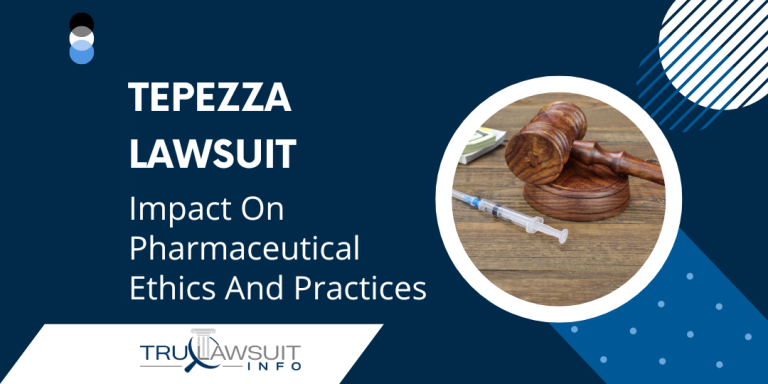
Pharmaceutical ethics are under scrutiny as dangerous drug lawsuits, such as the Tepezza lawsuit against drug manufacturer Horizon Pharmaceuticals, unfold.
The implications of these product liability cases have raised eyebrows and brought attention to questionable actions within the industry.
As we delve into the details of this case, it becomes evident that a shift in ethical practices is imperative for pharmaceutical companies moving forward.
Table of Contents
Growing Lawsuits over Tepezza's Potential Hearing Damage
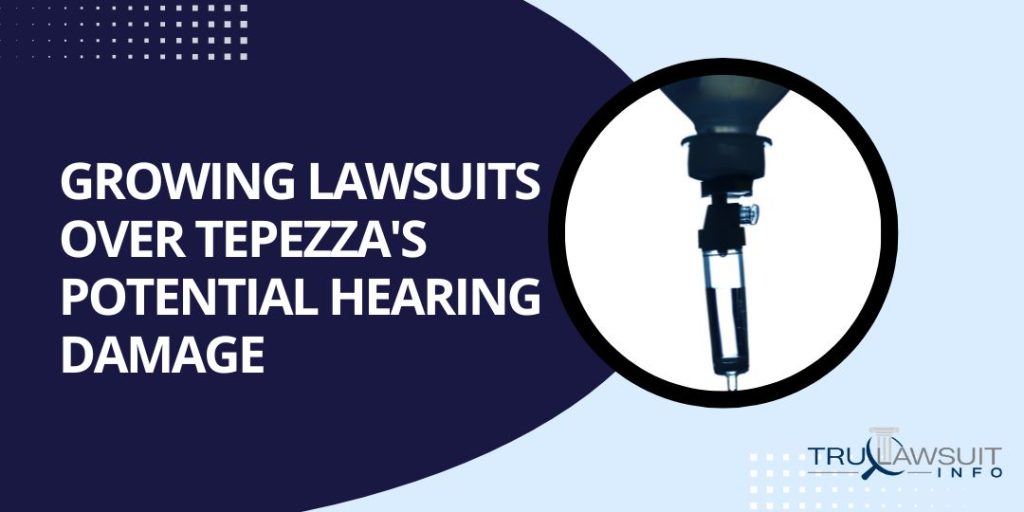
The use of Teprotumumab treatment, primarily prescribed for thyroid eye disease (TED), has been associated with an alarming increase in lawsuits related to potential tinnitus side effects and vision impairment.
Patients who have experienced otologic symptoms or hearing loss or tinnitus after using Teprotumumab treatment are seeking legal action against the pharmaceutical company responsible for manufacturing and distributing the drug.
Highlighting a Pattern of Hearing Impairment
Mounting evidence suggests a link between Tepezza and tinnitus, hearing impairment, and other related side effects, prompting individuals to file lawsuits in pursuit of compensation for their potential side effects.
These lawsuits highlight the need for a closer examination of pharmaceutical ethics and practices surrounding the development and distribution of medications, including FDA regulations.
One of the key factors driving these lawsuits is the growing number of individuals suffering from hearing loss and tinnitus, and related side effects after using Tepezza.
As more plaintiffs emerge, it becomes evident that this issue is not isolated but rather part of a larger pattern in multidistrict litigation.
Similar lawsuits have been filed by patients who have experienced hearing loss due to other medications, indicating that this problem extends beyond Tepezza alone.
The Crucial Role of Warning Labels
The trials involving Tepezza-related tinnitus and hearing loss side effects shed light on a crucial aspect: the lack of adequate warning labels provided with the medication.
Many patients argue that they were not adequately informed about the risk of potential hearing impairment when they began using Tepezza.
This lack of warning to patients has left them suffering from irreversible damage without any recourse.
The FDA should take note of these concerns.
Furthermore, as more plaintiffs become aware of these multidistrict litigation hearings related to Tepezza by Horizon Therapeutics, others may come forward with their own experiences, further adding to the number of lawsuits being filed.
The collective weight of these Tepezza lawsuits will undoubtedly impact pharmaceutical practices and ethics moving forward.
Responsibility of Pharmaceutical Companies
Pharmaceutical companies must take responsibility for ensuring that their drugs, such as Teprotumumab, are thoroughly tested and accompanied by accurate warning labels for potential hearing damage.
Negligence in this regard can lead to severe consequences for patients who trust these medications to improve their health, especially those suffering from tinnitus.
The mounting number of lawsuits related to Tepezza’s potential hearing damage serves as a wake-up call for both manufacturers and regulatory bodies alike, highlighting the need for multidistrict litigation.
Qualifying for a Tepezza Lawsuit or Claim
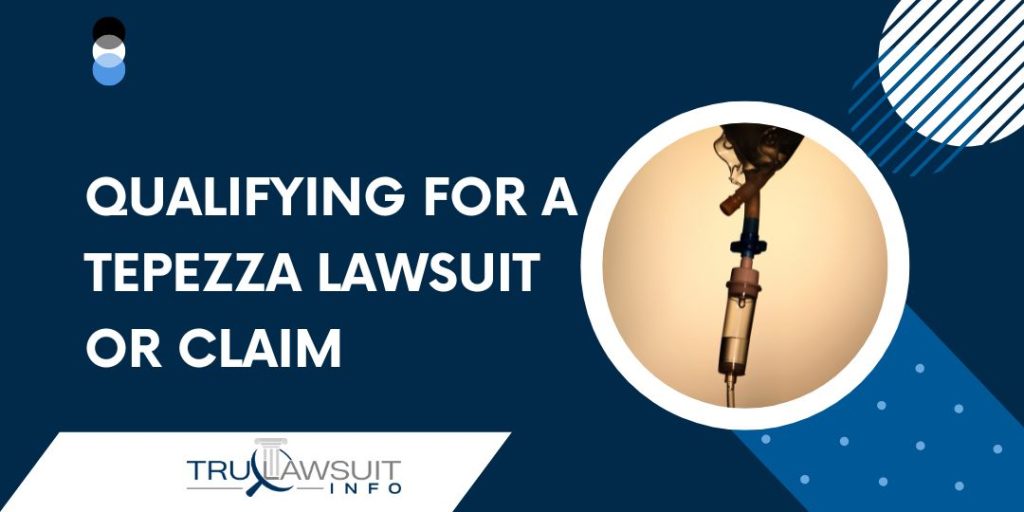
To pursue legal action related to Tepezza users Teprotumumab, individuals must meet specific criteria and eligibility requirements.
Filing a lawsuit or claim against the manufacturers of Tepezza, in hearing loss lawsuits, entails fulfilling certain conditions and providing evidence to support their case.
For more information, visit our study page.
Criteria for Qualification
Several factors determine whether an individual qualifies for a Tepezza lawsuit or claim.
These include the following:
- Usage of Tepezza: To be eligible, individuals must have used Tepezza as part of their medical treatment. This could involve receiving the medication directly or having it administered by healthcare professionals.
- Adverse Effects: Individuals seeking legal recourse must have experienced adverse effects or harm resulting from their use of Tepezza. These adverse effects can range from severe side effects to long-term health complications.
- Causation: Establishing a causal link between the use of Tepezza and the harm suffered is crucial in qualifying for a lawsuit or claim. Individuals need to demonstrate that their injuries were directly caused by the medication rather than other factors.
- Timeliness: It is important to file a lawsuit within the applicable statute of limitations, which varies depending on the jurisdiction and circumstances surrounding the case.
Acting promptly ensures that individuals do not miss out on their opportunity to seek compensation.
Requirements for a Valid Case
In order to build a strong class action lawsuit against Horizon, the law firm needs to have certain elements present in the case against those responsible for producing and distributing Teprotumumab, known as Tepezza.
These elements include:
- Medical Records: Collecting comprehensive medical records that document the individual’s usage of Tepezza and any subsequent adverse effects is essential. These records will serve as crucial evidence in supporting their claim.
- Expert Testimony: In many cases, expert testimony from medical professionals specializing in relevant fields may be necessary to establish causation between Tepezza usage and the harm suffered by the individual.
- Product Liability: Understanding the legal principles of product liability is important for a successful case. Individuals must demonstrate that Tepezza was defective in some way, such as having inadequate warnings or being improperly manufactured.
- Legal Representation: Engaging the services of an experienced attorney who specializes in pharmaceutical litigation is highly recommended. A skilled lawyer will navigate the complexities of the legal process and advocate for the individual’s rights.
Filing a Successful Claim
To file a successful claim concerning their use of Teprotumumab (Tepezza), individuals must meet specific requirements.
These requirements include providing evidence of a diagnosed thyroid eye disease (TED) and demonstrating that they have been prescribed Teprotumumab by a healthcare professional.
Additionally, individuals must show that they have followed the prescribed treatment plan and have not experienced any significant improvement in their condition.
If you believe you meet these criteria, contact TruLaw to discuss your potential claim for hearing loss caused by Teprotumumab.
One of the key requirements for filing a successful claim with TruLaw is to have a diagnosed thyroid eye disease (TED).
This can be confirmed through medical records and documentation from a healthcare professional.
The diagnosis is crucial as Teprotumumab (Tepezza) is specifically approved for the treatment of TED and may not be prescribed for other eye conditions.
Furthermore, individuals must provide evidence that they have been prescribed teprotumumab (Tepezza) by a healthcare professional.
This can be in the form of prescription records or a letter from the prescribing physician.
It is important to establish that the individual has been recommended this particular medication for their TED treatment.
In addition to the diagnosis and prescription, individuals must also demonstrate that they have followed the prescribed treatment plan for TED using Teprotumumab.
This may involve providing documentation of medication adherence, attending follow-up appointments, and following any lifestyle recommendations given by the healthcare professional.
This shows that the individual has taken the necessary steps to treat their TED using Teprotumumab.
Lastly, individuals must show that despite following the prescribed treatment plan with Teprotumumab (Tepezza), they have not experienced any significant improvement in their condition of Thyroid Eye Disease (TED).
This can be supported by medical records, visual evidence of the condition, and testimonies from the healthcare professional.
It is important to establish that Tepezza did not effectively alleviate the symptoms of TED for the individual.
If you have experienced hearing loss while taking Tepezza, you may be eligible for a lawsuit.
Contact TruLaw to discuss your case and the potential for compensation under the Horizon program.
Average Tepezza Settlement Amount and Estimated Value
In cases involving Tepezza and hearing loss injuries, the settlement process plays a crucial role in compensating victims.
Let’s take a closer look at typical settlement amounts awarded in Tepezza hearing loss cases and estimate the financial value victims may receive.
Factors Affecting Settlement Amounts
Determining settlement amounts in lawsuits connected with the harm caused by using Tepezza involves careful consideration of various factors, including hearing and horizon.
One key factor is the severity of the injuries suffered by the victim.
The more severe the adverse effects, such as vision loss or cardiovascular complications, the higher the potential settlement amount tends to be.
The duration and extent of medical treatment required due to these injuries can influence the final settlement.
Another important aspect that affects average settlement amounts in hearing loss cases is whether there is clear evidence linking Tepezza usage to the injuries sustained by the victim.
If strong scientific evidence establishes a direct causal relationship between Tepezza and specific adverse effects related to hearing loss, it strengthens the plaintiff’s case for a higher settlement amount.
Conversely, if causation is difficult to prove or disputed, it may impact both settlements and estimated values in hearing loss cases.
This is particularly important when considering legal representation from TruLaw for hearing loss cases.
The pharmaceutical company responsible for manufacturing Tepezza also plays a significant role in determining settlement amounts for loss.
In some cases, companies may choose to settle out of court to avoid negative publicity or lengthy legal battles related to loss.
However, when calculating an estimated value for potential compensation through settlements related to Tepezza’s adverse effects causing loss, it is essential to consider how willing pharmaceutical companies are to negotiate fair settlements for loss.
Estimated Settlement Ranges
It’s worth noting that each lawsuit involving Tepezza injuries and hearing loss is unique and may have different circumstances influencing settlement amounts.
However, based on previous cases involving similar pharmaceutical products and hearing loss, we can provide some general estimate:
- Mild to moderate injuries, such as hearing loss, caused by Tepezza could result in settlement amounts ranging from $50,000 to $200,000.
- Severe injuries, including the first Tepezza hearing loss lawsuits, Tepezza hearing loss lawsuits, Tepezza class action lawsuits, and Tepezza lawsuits involving permanent disability or organ damage, might result in settlements ranging from $200,000 to several million dollars.
These Tepezza hearing damage lawsuits and case estimates are not definitive and should be taken as a general guideline.
The final settlement amount depends on the specific details of each Tepezza class action lawsuit and the strength of the evidence presented in Tepezza hearing loss lawsuits.
Negative Side Effects of Tepezza and Possible Risks
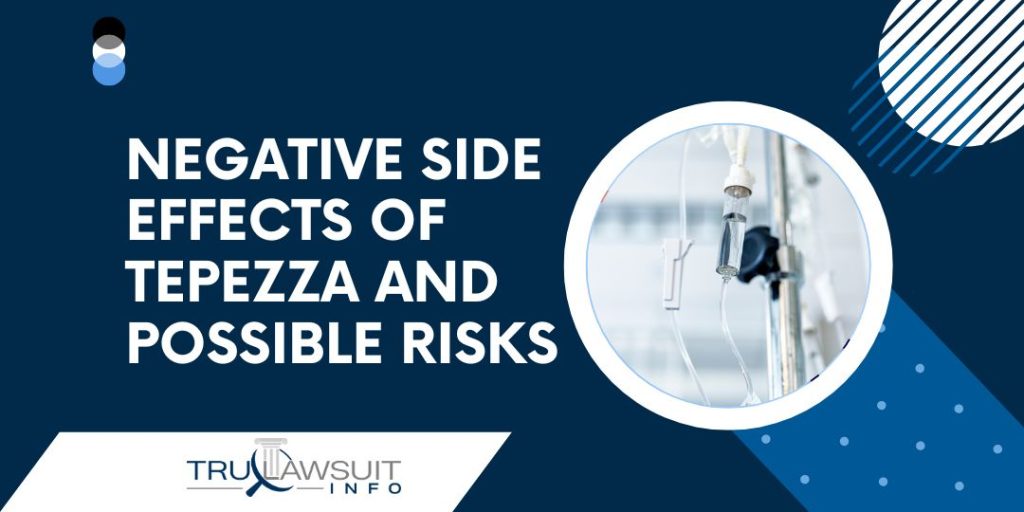
Tepezza, a medication used to treat thyroid eye disease (TED), has been associated with several negative side effects and potential risks, including hearing loss.
Understanding these adverse reactions is crucial for patients considering Tepezza infusions.
This section will delve into the various side effects related to Tepezza usage, including the risk of hearing loss, and discuss the possible risks and complications that can arise from taking this medication.
Explanation of the Various Negative Side Effects Associated with Tepezza Usage
Tepezza, while effective in treating TED, may cause certain side effects that can impact individuals differently, including hearing loss.
These possible side effects vary in severity.
Some common symptoms reported by patients undergoing Tepezza treatment include:
- Headaches
- Muscle cramps
- Nausea
- Fatigue
- Diarrhea
- Insomnia
It is important to note that not all patients with hearing loss experience these side effects, and they may differ in frequency and intensity among individuals.
However, anyone considering Tepezza should consult their healthcare provider to gain a comprehensive understanding of the potential negative effects of hearing loss.
Discussion on the Potential Risks and Complications That Can Arise from Taking Tepezza
In addition to its possible side effects, there are potential risks and complications associated with using Tepezza that can lead to hearing loss.
While rare, some patients have reported more severe adverse reactions related to hearing loss that require immediate medical attention.
These include the following:
- Allergic Reactions: In some cases, individuals with hearing loss may develop allergic reactions to Tepezza infusions. Symptoms such as hives, difficulty breathing, or swelling of the face or throat should be treated as emergencies.
- Liver Problems and Hearing Loss: There have been instances where liver problems and hearing loss occurred in patients receiving Tepezza treatment.
- Increased Risk of Infections and Hearing Loss: Due to its impact on the immune system, Tepezza may increase susceptibility to infections or make existing infections worse, which can also potentially lead to hearing loss.
Patients with hearing loss must be vigilant and promptly report any concerning symptoms related to their hearing to their healthcare providers.
Regular check-ups and open communication with medical professionals are essential for managing potential risks associated with Tepezza usage.
Overview of the Adverse Reactions Reported by Patients Who Have Used Tepezza
Patients with hearing loss who have used Tepezza have reported various adverse reactions, ranging from mild to severe.
Examining the Impact of the Tepezza Lawsuit on Pharmaceutical Practices
The Tepezza lawsuit has sent shockwaves through the pharmaceutical industry, prompting a closer examination of ethical standards and practices related to hearing loss.
This legal action, which involves a prescription drug developed by Horizon Pharmaceuticals for hearing loss, has not only brought attention to potential issues surrounding the medication but has also led to significant changes in regulations and protocols within the industry for hearing loss treatments.
Litigation as a Catalyst for Change
The case review of the Tepezza lawsuits has shed light on various aspects of pharmaceutical practices related to hearing loss that require scrutiny.
One key area that has come under intense scrutiny is the conduct of clinical trials for hearing loss.
Attorneys representing patients with hearing loss have raised concerns about the adequacy of these trials in assessing potential risks and side effects associated with the drug.
As a result, regulatory bodies are now closely monitoring clinical trial processes for hearing loss to ensure greater transparency and patient safety.
Furthermore, the Tepezza lawsuits multidistrict litigation has prompted pharmaceutical companies to reevaluate their marketing strategies and how they communicate the potential risks of Tepezza to healthcare providers and patients.
The exposure of court documents during legal proceedings has revealed instances where crucial information about Tepezza may not have been adequately disclosed or may have been downplayed by both Tepezza lawyers and drug manufacturers.
In response, companies are now taking steps to improve transparency and provide more accurate information regarding Tepezza in Tepezza class action lawsuits and Tepezza hearing loss lawsuits cases.
Adapting Practices in Light of Litigation
Pharmaceutical companies are swiftly adapting their practices due to the impact of Tepezza-related lawsuits.
They are placing greater emphasis on comprehensive risk assessments during clinical trials for hearing loss, ensuring that potential side effects for hearing loss are thoroughly evaluated before drugs receive approval for public use.
This includes conducting longer-term studies to monitor any delayed adverse reactions for hearing loss that may arise after initial administration.
There is a growing recognition among pharmaceutical companies that collaboration with healthcare professionals is essential for patient safety, especially when it comes to Tepezza infusions.
By establishing stronger lines of communication between manufacturers and prescribers, it becomes easier to relay critical information about potential risks or changes in drug administration guidelines promptly, which can be crucial for patients with hearing loss.
Long-term Effects on Pharmaceutical Practices
The Tepezza lawsuit has the potential to have far-reaching effects on pharmaceutical practices in the long run.
The judicial panel overseeing these hearing cases is tasked with determining liability and potentially awarding damages to affected patients. If substantial penalties are imposed, it could serve as a deterrent for other companies engaging in questionable practices.
Moreover, the increased scrutiny resulting from Tepezza hearing loss lawsuits may lead to a more cautious approach by pharmaceutical companies when developing and marketing new medications, such as Tepezza infusions.
Exploring Thyroid Eye Disease and its Inflammatory Nature
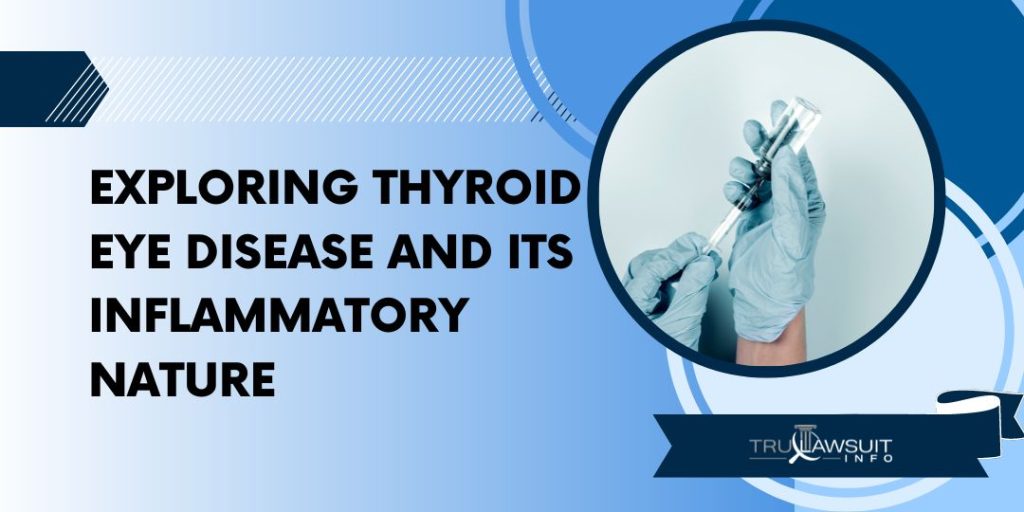
Thyroid eye disease (TED) is a condition characterized by inflammation in the eyes, which can lead to various symptoms, vision impairment, and the need for Tepezza infusions.
Understanding the inflammatory nature of TED is crucial for comprehending its impact on patients and the ethical implications it raises for pharmaceutical practices, including potential Tepezza hearing loss lawsuits.
Impact of Inflammation on TED
TED affects the eyes by causing inflammation, swelling, and other related conditions.
In the early stages of the disease, patients may experience vision impairment due to muscle and tissue swelling around the eyes.
This can result in double vision, blurred vision, or even loss of vision in severe cases.
The discomfort caused by inflammation can be debilitating, leading to a significant decline in a patient’s quality of life.
Tepezza infusions have shown promising results in reducing inflammation and improving vision for patients with TED.
Patients undergoing Tepezza infusions have reported positive outcomes in their Tepezza hearing and overall eye health.
The underlying causes and mechanisms behind TED’s inflammatory nature, including Tepezza’s hearing loss, are still being studied.
It is believed that an autoimmune response triggers inflammation in individuals with thyroid dysfunction.
The immune system mistakenly attacks healthy cells around the eyes, resulting in inflammation and related symptoms.
Research suggests that TED may also involve changes in blood flow and alterations in connective tissues within the eye socket.
Tepezza Lawsuit: Importance for Treatment and Development
Understanding how TED manifests as an inflammatory condition, including the potential for Tepezza hearing loss, is essential for developing effective treatments and improving patient outcomes.
Pharmaceutical companies have been exploring new drugs aimed at managing inflammation associated with TED, including addressing potential hearing loss caused by Tepezza.
These medications target specific pathways involved in the inflammatory response, reducing swelling and alleviating symptoms experienced by patients.
The impact of Tepezza lawsuits on pharmaceutical ethics and practices cannot be overlooked when discussing TED’s inflammatory nature.
Tepezza, a drug approved by the U.S. Food and Drug Administration (FDA) for treating TED-related eye and hearing problems, has faced legal challenges due to allegations of unethical marketing practices by its manufacturer.
These lawsuits have brought attention to the hearing industry.
Pharmaceutical ethics play a vital role in ensuring patient safety and promoting transparency within the industry.
When companies prioritize profit over ethical considerations, it can negatively affect patient care and undermine trust between healthcare providers and pharmaceutical manufacturers.
Serious Hearing Loss Caused By Tepezza: Mechanisms And Concerns
Examination of the mechanisms through which Tepezza can cause severe hearing loss in individuals:
Tepezza, a medication primarily used for the treatment of thyroid eye disease, has been associated with cases of serious hearing loss.
Understanding the mechanisms behind this adverse effect is crucial in comprehending its impact on patients.
One possible mechanism is that Tepezza may disrupt the delicate structures within the inner ear responsible for transmitting sound signals to the ringing in the ears and brain.
Discussion on the concerns surrounding hearing impairment as a side effect of using Tepezza medication:
The emergence of hearing impairment as a potential side effect raises significant concerns among both medical professionals and patients.
Hearing loss can have profound implications on an individual’s quality of life, affecting their ability to communicate, work, and engage in social activities.
Moreover, it poses challenges in terms of diagnosis and management since it may persist even after discontinuing Tepezza treatment.
Overview of how Tepezza induces significant hearing damage, including potential physiological processes involved:
Tepezza-induced hearing loss occurs due to various physiological processes that are disrupted by the medication.
It is believed that Tepezza may interfere with the functioning of hair cells within the cochlea—the spiral-shaped structure responsible for converting sound vibrations into electrical signals.
These hair cells play a critical role in auditory perception, and any damage inflicted upon them can result in permanent hearing impairment.
Analysis of the reasons why serious hearing loss caused by Tepezza is a major concern for both medical professionals and patients:
The occurrence of serious hearing loss as a consequence of using Tepezza raises several concerns within the medical community.
Firstly, healthcare providers must be vigilant when prescribing this medication to ensure they inform patients about this potential risk and monitor their auditory health closely during treatment.
Secondly, pharmaceutical companies need to prioritize rigorous testing and evaluation procedures during drug development to identify such adverse effects early on.
Patients, on the other hand, face the distressing prospect of potential hearing loss when undergoing Tepezza treatment.
This concern may lead some individuals to question whether the benefits of using this medication outweigh the risks.
It is essential for patients to have open and honest discussions with their healthcare providers to make informed decisions about their treatment options.
Tepezza and Permanent Hearing Damage: Is it Irreversible?
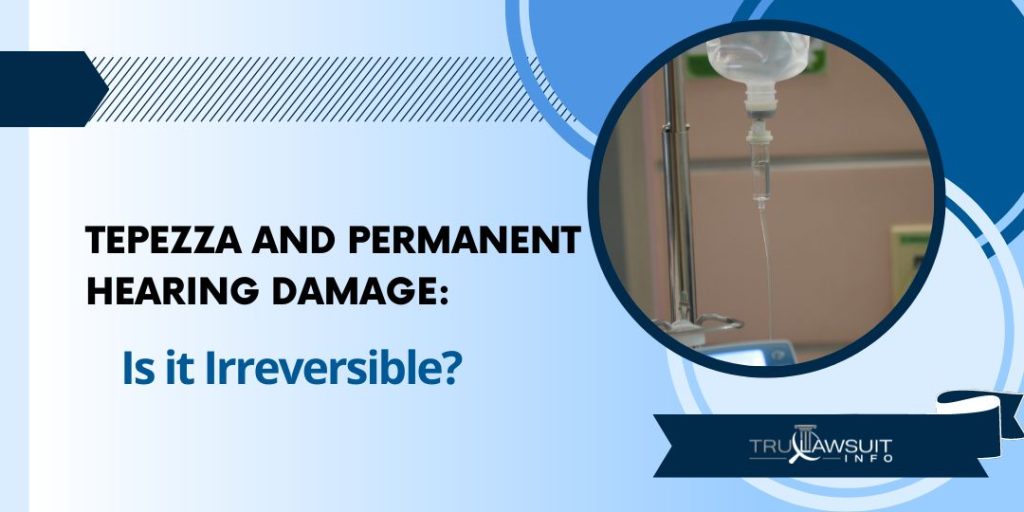
Permanent hearing damage caused by Tepezza medication is a concerning issue that raises questions about its reversibility.
Individuals who experience this irreversible condition face potential long-term consequences, impacting their prognosis and quality of life.
Let’s delve into the current understanding regarding the reversibility of hearing damage caused by Tepezza and explore its implications for patients.
The Nature of Permanent Hearing Damage
It is crucial to determine if the damage caused by Tepezza is reversible or irreversible.
Unfortunately, studies suggest that once hearing impairment occurs, it tends to be permanent in affected individuals.
The severity of the impairment can range from mild to severe, with some cases resulting in complete sensorineural hearing loss.
Patients who experience permanent hearing loss due to using Tepezza medication may face various long-term consequences.
Beyond the obvious challenges of communication and social interactions, these individuals may struggle with emotional well-being and mental health issues as a result of their diminished auditory capabilities.
Moreover, their ability to perform daily activities that rely heavily on hearing could be significantly compromised.
Limited Treatment Options
Currently, there are limited treatment options available for reversing hearing damage caused by Tepezza.
While certain interventions like cochlear implants can help improve communication abilities in severe cases of hearing impairment, they do not restore normal auditory function entirely.
These interventions primarily focus on bypassing damaged hair cells within the ear and transmitting sound signals directly to the auditory nerve.
The implications of permanent hearing loss caused by Tepezza extend beyond physical limitations.
Patients facing this irreversible condition often endure a significant impact on their prognosis and quality of life.
The inability to engage fully in conversations or enjoy sounds, such as music, can lead to feelings of isolation and frustration.
Furthermore, career prospects may be affected due to difficulties in professional settings where effective communication is essential.
Delaying Post-Marketing Study: Implications for Tepezza Lawsuits
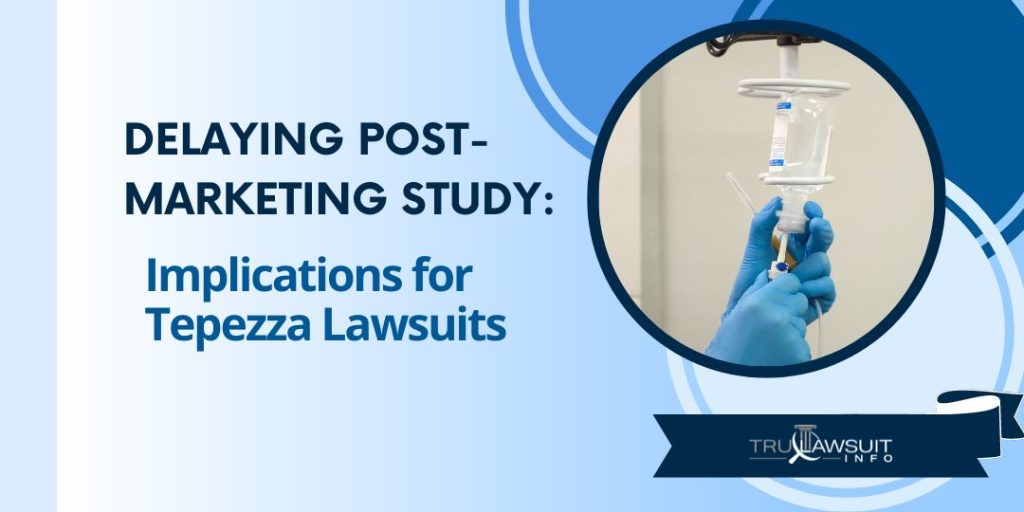
Post-marketing studies play a crucial role in evaluating the safety and efficacy of pharmaceutical products after they have been approved for public use.
However, when these studies are delayed, it can have significant implications for lawsuits related to the drug in question.
In the case of Tepezza, the delay in conducting post-marketing studies has raised concerns regarding the availability of evidence and its impact on litigation against Tepezza manufacturers.
The Impact of Postponed Post-Marketing Studies
The postponement of post-marketing studies directly affects the availability of crucial evidence that could be used by individuals pursuing legal action against Tepezza manufacturers.
These studies provide an opportunity to gather real-world data on the drug’s effects, including any potential adverse reactions or long-term consequences.
Without timely access to such information, plaintiffs may face challenges in building a strong case against the manufacturers.
One consequence resulting from postponed post-marketing studies is that it hampers individuals seeking compensation for damages caused by Tepezza.
The delay prolongs their legal battles, preventing them from receiving timely justice and potentially exacerbating their suffering.
Moreover, without up-to-date data from these studies, it becomes difficult to establish a clear link between the drug and any harmful side effects experienced by patients.
Broader Ethical and Regulatory Implications
The significance of delayed post-marketing studies extends beyond individual lawsuits.
It raises broader ethical questions about pharmaceutical practices and accountability.
When companies fail to prioritize these studies promptly, it undermines transparency and trust within the industry.
Patients rely on accurate information about medications to make informed decisions about their health, but delays in post-marketing research can leave them uncertain about potential risks associated with certain drugs.
Moreover, delayed post-marketing studies can also impact regulatory agencies’ ability to take necessary actions if safety concerns arise.
These agencies heavily rely on comprehensive data from such studies to evaluate whether additional warnings or restrictions should be placed on a particular medication.
When there are delays in conducting these studies, it hampers the regulatory process and potentially compromises patient safety.
Conclusion: The Impact of the Tepezza Lawsuit on Pharmaceutical Ethics and Practices
The Tepezza lawsuit has significantly impacted pharmaceutical ethics and practices, shedding light on the potential risks associated with this medication.
The growing number of lawsuits over Tepezza’s potential hearing damage is a cause for concern within the pharmaceutical industry.
Patients who have experienced negative side effects and have suffered permanent hearing loss due to Tepezza have sought legal recourse, resulting in a wave of litigation.
The impact of the Tepezza hearing loss lawsuit extends beyond individual claims.
It has prompted a closer examination of pharmaceutical practices, particularly regarding post-marketing studies and the delay in addressing concerns related to side effects.
This raises questions about whether adequate measures were taken by pharmaceutical companies to ensure patient safety.
Thyroid Eye Disease (TED) and its inflammatory nature have also been explored in relation to Tepezza.
The mechanisms behind serious hearing loss caused by this medication are being investigated, highlighting potential risks that were previously unknown or downplayed.
One key concern arising from the Tepezza lawsuit is the question of irreversibility.
Understanding whether such damage can be reversed or mitigated is crucial for both patients seeking compensation and future patients considering treatment options.
The estimated average settlement amount for Tepezza lawsuits provides insight into the financial implications faced by pharmaceutical companies as they address these claims.
This information may influence individuals considering whether they qualify for a Tepezza lawsuit or claim.
Moving forward, it is essential for pharmaceutical companies to prioritize patient safety and transparency throughout their research, development, and marketing processes.
Conducting thorough post-marketing studies promptly can help identify any unforeseen risks associated with medications like Tepezza, ensuring that patients receive accurate information about potential side effects before making treatment decisions.
In conclusion, the impact of the Tepezza lawsuit on pharmaceutical ethics and practices cannot be underestimated.
It highlights the need for greater accountability, transparency, and patient safety within the industry.
As consumers, it is important to stay informed about potential risks associated with medications and exercise caution when making healthcare decisions.
Frequently Asked Questions
-
Can I File A Lawsuit If I Have Experienced Hearing Damage Due To Tepezza?
If you have experienced suffered hearing loss or damage as a result of taking Tepezza, you may be eligible to file a lawsuit or Tepezza lawsuits claim.
It is advisable to consult with a legal professional who specializes in pharmaceutical litigation to determine the best course of action for your specific circumstances.
-
What Is The Average Settlement Amount For Tepezza Lawsuits?
The average settlement amount for Tepezza hearing damage lawsuit can vary depending on several factors, including the severity of the side effects experienced and the individual case’s unique circumstances.
It is essential to consult with a legal expert who can provide guidance based on your specific situation.
-
Is Permanent Hearing Damage Caused By Tepezza Reversible?
The question of whether permanent hearing damage caused by Tepezza is reversible remains under investigation.
Researchers are working to understand the mechanisms behind this side effect fully.
If you have experienced hearing loss due to Tepezza, it is crucial to seek medical advice and explore all available treatment options.
-
How Has The Tepezza Lawsuit Impacted Pharmaceutical Practices?
The Tepezza lawsuit has prompted closer scrutiny of pharmaceutical practices, particularly regarding post-marketing studies and addressing concerns related to side effects promptly.
This increased focus aims to ensure patient safety and improve transparency within the industry.
-
Why File a Tepezza Lawsuit?
Filing a Tepezza lawsuit may be necessary for individuals who have experienced harmful side effects or complications from the medication.
By filing a lawsuit, they may be able to seek compensation for medical expenses, pain and suffering, lost wages, and other damages caused by the drug.
Additionally, a lawsuit can hold the pharmaceutical company accountable for any negligence or wrongdoing in the manufacturing or marketing of Tepezza.

Experienced Attorney & Legal SaaS CEO
With over 25 years of legal experience, Jessie is an Illinois lawyer, a CPA, and a mother of three. She spent the first decade of her career working as an international tax attorney at Deloitte.
In 2009, Jessie co-founded her own law firm with her husband – which has scaled to over 30 employees since its conception.
In 2016, Jessie founded TruLaw, which allows her to collaborate with attorneys and legal experts across the United States on a daily basis. This hypervaluable network of experts is what enables her to share reliable legal information with her readers!
Have A Case?
Here, at Tru Lawsuit Info, we’re committed to helping victims get the justice they deserve.
To do this, we actively work to connect them with attorneys who are experts in litigating cases similar to theirs.
Would you like our help?
Tru Lawsuit Info is a reliable source of information about issues that may affect your health and safety, such as faulty products, data breaches, and environmental hazards.
Our team of experienced writers collaborates with medical professionals, lawyers, and advocates to produce informative articles, guides, and other resources that raise awareness of these topics.
Our thorough research provides consumers with access to reliable information and updates on lawsuits happening around the country. We also can connect consumers with attorneys if they need assistance.
Camp Lejeune's water contamination issue spanned several decades starting in the 1950s. Exposure to these chemicals has been linked to various serious health issues, including cancer, organ diseases, and death.
Research is increasingly suggesting a link between the use of Tylenol during pregnancy and the development of neurodevelopmental disorders, such as autism and ADHD, in infants.
Legal action is being taken against manufacturers of Aqueous Film-Forming Foam (AFFF), a chemical used in fighting fires. The plaintiffs allege that exposure to the foam caused health issues such as cancer, organ damage, and birth and fertility issues.
Have A Case?
Here, at Tru Lawsuit Info, we’re committed to helping victims get the justice they deserve.
To do this, we actively work to connect them with attorneys who are experts in litigating cases similar to theirs.
Would you like our help?







